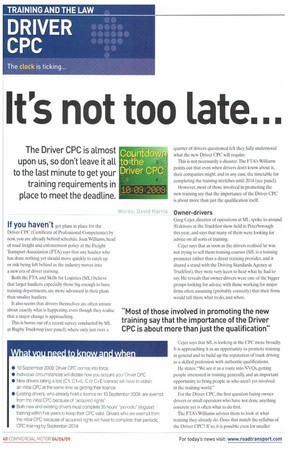It's not too Late...
Page 40

Page 41

If you've noticed an error in this article please click here to report it so we can fix it.
The Driver CPC is almost upon us, so don't leave it all to the last minute to get your training requirements in place to meet the deadline.
If you haven't got plans in place for the Driver CPC (Certificate of Professional Competence) by now, you are already behind schedule. Joan Williams, head of road freight and enforcement policy at the Freight Transport Association (FTA) says that any haulier who has done nothing yet should move quickly to catch up or risk being left behind as the industry moves into a new era of driver training.
Both the FTA and Skills for Logistics (SfL) believe that larger hauliers, especially those big enough to have training departments, are more advanced in their plans than smaller hauliers.
It also seems that drivers themselves are often unsure about exactly what is happening, even though they realise that a major change is approaching.
This is borne out of a recent survey conducted by SfL at Rugby Tnickstop (see panel), where only just over a quarter of drivers questioned felt they fully understood what the new Driver CPC will require.
This is not necessarily a disaster. The PTA's Williams points out that even when drivers don't know about it, their companies might, and in any case, the timetable for completing the training stretches until 2014 (see panel). However, most of those involved in promoting the new training say that the importance of the Driver CPC is about more than just the qualification itself.
Owner-drivers
Greg C.ejer, director of operations at SfL, spoke to around 50 drivers at the Truckfest show held in Peterborough this year, and says that many of them were looking for advice on all sorts of training.
Cejer says that as soon as the drivers realised he was not trying to sell them training courses (SfL is a training promoter rather than a direct training provider, and it shared a stand with the Driving Standards Agency at Truckfest), they were very keen to hear what he had to say He reveals that owner-drivers were one of the bigger groups looking for advice, with those working for major firms often assuming (probably correctly) that their firms would tell them what to do, and when.
"
Cejer says that SfL is looking at the CPC more broadly. It is approaching it as an opportunity to promote training in general and to build up the reputation of truck driving as a skilled profession with authentic qualifications.
He states: "We see it as a route into NVOs, getting people interested in training generally and an important opportunity to bring people in who aren't yet involved in the training world."
For the Driver CPC, the first question facing ownerdrivers or small operators who have not done anything concrete yet is often what to do first.
The FTA's Williams advises them to look at what training they already do. Does that match the syllabus of the Driver CPC? If so, it is possible even for smaller hauliers to turn themselves into an accredited training provider. Bigger firms routinely do this, and several (see panel) have turned their training programmes into a potential money-maker by providing a service for drivers outside their own company as well as inside it.
Taking it seriously
However, if you have looked at what you are doing already and you decide to buy in training, you can see a list of providers on government websites (see below).
These will indicate nearby training organisations, but, as Williams is quick to point out, there are also training bodies (including the FTA) that will come to you.
Of course, it goes without saying that you should shop around for the best deal, both in terms of what you are going to pay and the level of training you get.
Like Cejer, Williams is keen to stress the importance of taking the training seriously, as well as merely following the regulations. She believes, for example, that it is much better for driver training to be structured and steady rather than intensive and occasionai.The legal requirement is for 35 hours "periodic" training every five years, but most training specialists advise that this will be more effective taken in several blocks, perhaps once a year, rather than all at once.
The regulations are all very well, but the underlying aim is to make drivers better and safer on and off the road. •
Useful contacts: •
(for hauliers and drivers) •
(for training organisations)
















































































































































